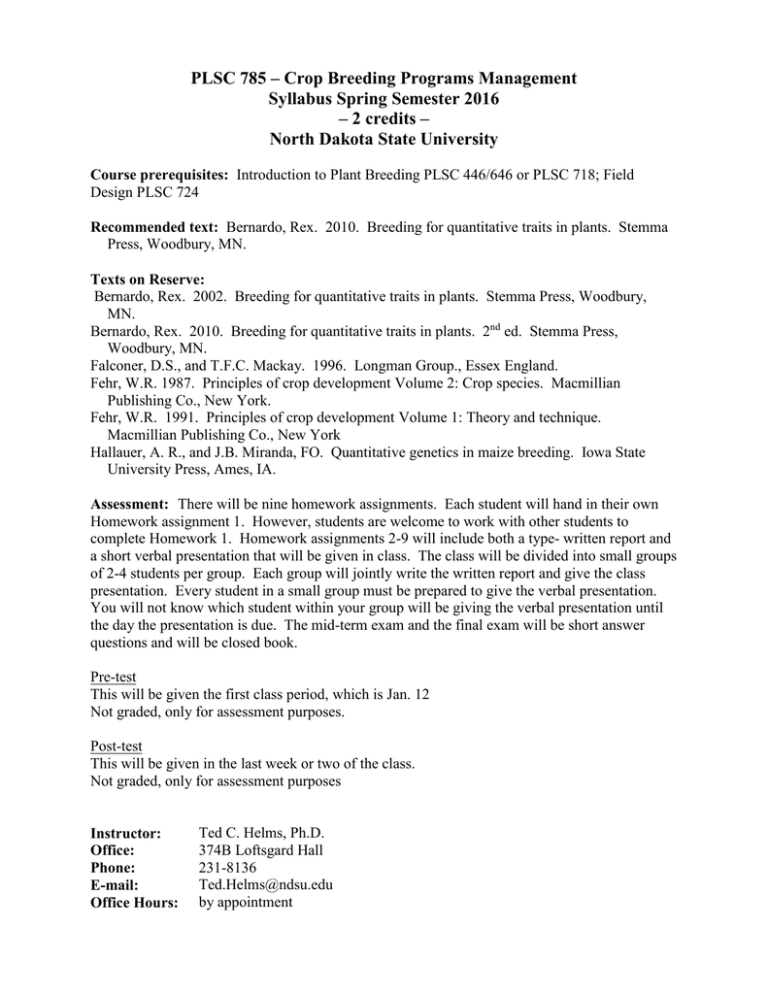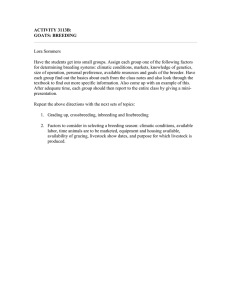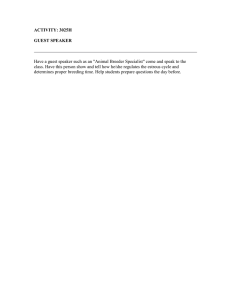PLSC 785 Syllabus - NDSU Agriculture
advertisement

PLSC 785 – Crop Breeding Programs Management Syllabus Spring Semester 2016 – 2 credits – North Dakota State University Course prerequisites: Introduction to Plant Breeding PLSC 446/646 or PLSC 718; Field Design PLSC 724 Recommended text: Bernardo, Rex. 2010. Breeding for quantitative traits in plants. Stemma Press, Woodbury, MN. Texts on Reserve: Bernardo, Rex. 2002. Breeding for quantitative traits in plants. Stemma Press, Woodbury, MN. Bernardo, Rex. 2010. Breeding for quantitative traits in plants. 2nd ed. Stemma Press, Woodbury, MN. Falconer, D.S., and T.F.C. Mackay. 1996. Longman Group., Essex England. Fehr, W.R. 1987. Principles of crop development Volume 2: Crop species. Macmillian Publishing Co., New York. Fehr, W.R. 1991. Principles of crop development Volume 1: Theory and technique. Macmillian Publishing Co., New York Hallauer, A. R., and J.B. Miranda, FO. Quantitative genetics in maize breeding. Iowa State University Press, Ames, IA. Assessment: There will be nine homework assignments. Each student will hand in their own Homework assignment 1. However, students are welcome to work with other students to complete Homework 1. Homework assignments 2-9 will include both a type- written report and a short verbal presentation that will be given in class. The class will be divided into small groups of 2-4 students per group. Each group will jointly write the written report and give the class presentation. Every student in a small group must be prepared to give the verbal presentation. You will not know which student within your group will be giving the verbal presentation until the day the presentation is due. The mid-term exam and the final exam will be short answer questions and will be closed book. Pre-test This will be given the first class period, which is Jan. 12 Not graded, only for assessment purposes. Post-test This will be given in the last week or two of the class. Not graded, only for assessment purposes Instructor: Office: Phone: E-mail: Office Hours: Ted C. Helms, Ph.D. 374B Loftsgard Hall 231-8136 Ted.Helms@ndsu.edu by appointment Class Time, Place: Tuesday & Thursday 3:00 – 3:50 p.m. Meets in Loftsgard Rm. 102. Course Description: It is essential that a student understand the different methods used to breed different species of crops and the associated mathematical concepts. This course is designed to further a student’s understanding of biometrical concepts as applied to practical breeding programs. Breeders of various crops will provide first-hand information on how they manage their breeding programs. Students will have the opportunity to develop a breeding program, select parents for breeding and discuss advanced topics. Also, personnel management will be discussed. The aim is to prepare our students to develop a breeding program, which includes choice of breeding methods and germplasm. This will make the student more competitive for job opportunities. No class: Jan. 18 (Martin Luther King Day) Feb. 15 (President’s Day) March 14-18 (Spring break) March 25-28 (Spring Holiday) Lecture Syllabus The syllabus will correspond closely to the index of the online document, which are also provided below. I will have several small group projects with verbal reports in class and a class discussion period. Topic Genetic variances for crossbred and inbred families Inbreeding methods in self-pollinating crops Review of heritability and genetic gain formulas HW 1 due: Review of Breeding methods Theory of resource allocation G X E interactions and plant breeding HW 2 due: Verbal G X E interaction reports Selection for multiple traits HW3 due: calculation of genetic gain (no verbal reports) Maize breeding and choice of tester Date Jan. 12 Jan. 14 Jan. 19 Jan. 19 Jan. 21 Jan. 26 Jan. 28 Feb. 2 Feb. 4 Feb. 4 Breeding for biotic stress: Soybean Cyst Nematode and MAS Breeding for biotic stress: Phytophthora root rot in soybean Breeding Program Goals & Choice of Parents HW4: Class reports on designing a HRSW breeding program Guest Lecture: HRSW breeder Guest Lecture: Woody ornamental improvements Mather-Jinks Generation Mean Analysis HW5: Class reports on designing a potato breeding program Guest Lecturer: Potato breeder Choice of parents Mid-term Exam Spring Break Feb. 9 Feb. 9 Feb. 11 Feb. 16 Feb. 18 Feb. 23 Feb. 25 March 1 March 3 March 8 March 10 March 14-18 Gardner-Eberhart generation means analysis lecture 1 HW6: Class report on choice of parents for a pulse crop Break Guest Lecture: Pulse breeder Gardner-Eberhart generation means analysis lecture 2 HW7: Class report on designing a sunflower improvement program Guest Lecture: Sunflower improvement March 22 March 24 March 25-28 March 29 March 31 April 5 April 7 Guest Lecture: Cooperating scientist Wheat milling quality Flanking markers and MAS HW 8: Class report on GCA & SCA April 12 April 14 April 19 Guest Lecture: Commercial maize breeder Association mapping & Post-test HW 9: Class report on empirical results of MAS Guest Lecture: Association mapping April 21 April 26 April 28 May 3 Human resource management Human resource management lecture Final Exam May 5 Grading Grade Categories Class homework Mid-term exam Comprehensive Final exam Percent of Final Class Grade 25 25 50 Points by Categories 100 100 200 Exams will be completed individually and you will not be allowed to access books, notes, electronic devices, or other sources of information unless otherwise instructed. Calculators must only be used for basic calculating. Missed exams can be made up by appointment within two weeks of the scheduled exam date. The following point totals are a guide for letter grades. 360 - 400 A 320 - 359 B 260 - 319 C 200 - 259 D 199 or less F Course Objectives: - To understand the theory of resource allocation in a breeding program. - To be able to analyze and interpret the results of genetic experiments. - To become more familiar with the breeding process for different crops. - To be able to design a breeding program. - To better understand the importance of a multi-disciplinary approach to plant breeding that involves cooperative research with scientists of related disciplines. Cancellations: Cancellation of a class meeting time automatically delays all scheduled activities, including exams, to the next scheduled meeting time. Students with Disabilities are asked to inform the instructor so that arrangements can be made in cooperation with the Office of Disability Services to provide appropriate services. Students also may contact the Disability Services Office directly (231-8463). The Honor System as outlined by the College of Agriculture, Food Systems, and Natural Resources (http://www.ag.ndsu.edu/academics/honor-system-1) will be followed in this course. Students have the privilege and responsibility to conduct academic work honestly. This includes reporting of suspected dishonest activities as well as maintaining personal integrity. Examinations, quizzes, and other work are to be completed according to the policies of this Honor System. Your signature to the pledge “On my honor, I have neither given nor received aid in completing this assignment” affirms your commitment to and compliance with this system. An indication of dishonesty will be referred to the Honor Commission, which has student representation, for mediation. In addition, University Guidelines for academic honesty are outlined in NDSU University Senate Policy, Section 335: Code of Academic Responsibility and Conduct (http://www.ndsu.edu/fileadmin/policy/335.pdf).

